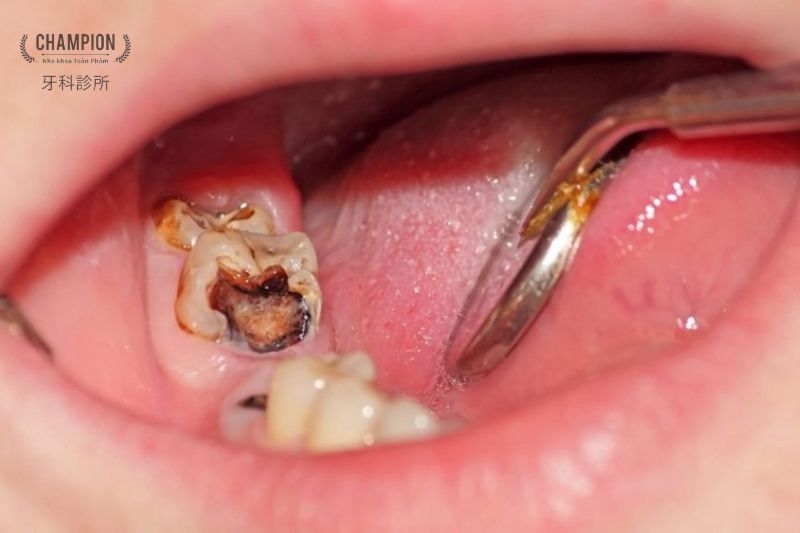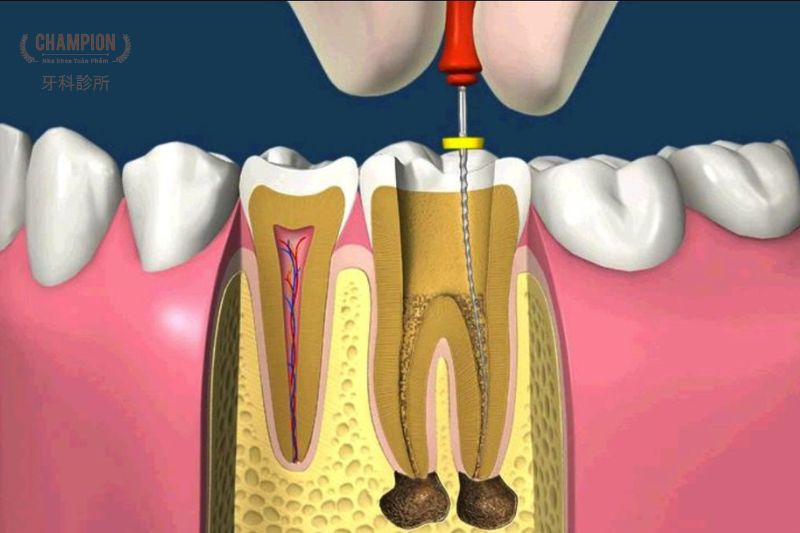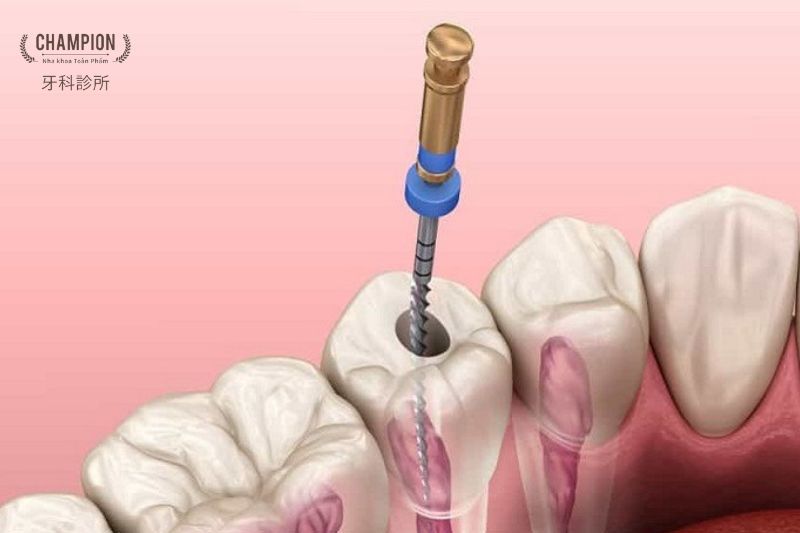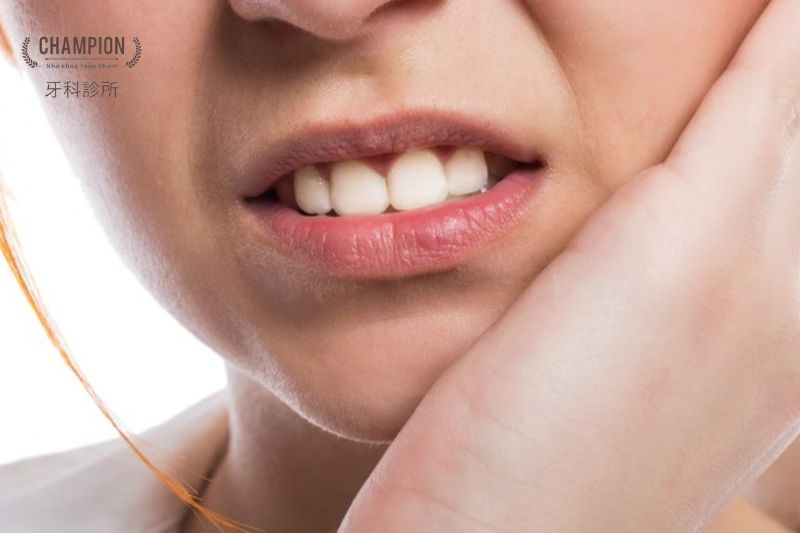Dental pulpitis is a highly prevalent issue in the field of dentistry and can lead to various painful and discomforting sensations. Understanding dental pulpitis and its treatment is crucial for maintaining oral health. This article from Champion Dental Clinic will help you gain a better understanding of this condition and suitable treatment options
What Is Dental Pulpitis?
Dental pulpitis is a condition characterized by inflammation and infection of the dental pulp, which is the soft tissue inside the tooth containing blood vessels and nerve fibers. Dental pulpitis typically occurs when bacteria infiltrate the dental pulp through the tooth's root canals, causing infection and inflammation. Common causes of dental pulpitis include tooth decay, cracked teeth, or trauma-induced damage.

Causes of Dental Pulpitis
The most common cause of dental pulpitis is tooth decay. When tooth decay progresses to the point where it reaches the dental pulp, bacteria can invade the pulp, leading to inflammation and infection. Additionally, dental pulpitis can be caused by other factors such as:
- Trauma to the tooth, resulting in fractures or exposing the dental pulp.
- Infections originating from other parts of the body, such as ear or sinus infections, spreading to the tooth.
- Severe gum inflammation (periodontitis).

Common Types of Dental Pulpitis
The dental pulp serves the function of providing nourishment and sensitivity to the tooth. When the dental pulp becomes inflamed and infected, the nerve fibers within it can be damaged, leading to pain and affecting oral health. Consequently, dental pulpitis can be categorized into three levels:
Reversible Pulpitis
Reversible pulpitis is a mild form of dental pulp inflammation where the dental pulp retains the ability to self-heal. Symptoms of reversible pulpitis are typically mild and transient, including:
- Tooth pain when consuming hot, cold, sweet, or sour foods.
- Tooth sensitivity to pressure.
Irreversible Pulpitis
Irreversible pulpitis is a severe form of dental pulp inflammation where the dental pulp is non-viable. Symptoms of irreversible pulpitis are typically more severe and persistent, including:
- Continuous, unbearable tooth pain.
- Swollen, red, and tender gums upon touch.
- Foul-smelling breath.
Irreversible pulpitis can be treated through either root canal therapy or tooth extraction.
Necrotic Pulpitis
Necrotic pulpitis is the most severe form of dental pulp inflammation, where the dental pulp has completely necrotized. Symptoms of necrotic pulpitis are similar to irreversible pulpitis but may include more severe signs such as:
- Intense, radiating tooth pain affecting surrounding areas.
- High fever.
- Pus drainage from the tooth's root canal.
Necrotic pulpitis is typically treated through tooth extraction. After extraction, a dentist may recommend tooth replacement options to restore chewing function and aesthetics.

>> See more: What is gum inflammation? How is gum inflammation treated?
Dental Pulpitis and the Most Effective Treatments
In cases of early-stage dental pulpitis, where the dental pulp still has the potential for recovery, treatment is often straightforward and effective. A dentist may prescribe antibiotics to control the infection without the need for pulp treatment. Therefore, if you experience tooth sensitivity to hot, cold, or fleeting pain, it's advisable to see a dentist as soon as possible for consultation and treatment.
In more severe cases of advanced dental pulpitis, when the tooth has deep cavities or fractures allowing bacteria to infiltrate and cause a severe infection, patients may experience intense and continuous throbbing pain. Even pain relievers may provide little relief. Exposure to hot or cold foods intensifies the pain. In such situations, dentists will perform pulp treatment. By removing the infected pulp, patients will gradually experience pain relief, and the condition of the tooth will improve.
Patients should remember that dental pulpitis cannot heal on its own and requires professional treatment. Attempting self-treatment at home can lead to the persistence of pulpitis and potential complications. Therefore, when experiencing any symptoms of dental pulpitis, it is crucial to seek care from specialized healthcare facilities, where dentists can diagnose and provide effective treatment.

What Not to Eat When Dealing with Dental Pulpitis?
During the treatment of dental pulpitis, it's important to pay attention to your diet to avoid irritating your teeth and worsening the inflammatory condition. Below are some foods that individuals with dental pulpitis should limit or avoid:
- Hard, Tough Foods: Hard and tough foods such as meats, bones, and various nuts can exert pressure on your teeth, potentially causing damage to both the teeth and the dental pulp.
- Hot or Cold Foods: Hot or cold foods can stimulate the dental pulp, leading to pain and discomfort.
- Acidic or Spicy Foods: Acidic or spicy foods can irritate the dental pulp, causing pain and sensitivity.
- Sugary Foods: Foods high in sugar create a favorable environment for bacterial growth, exacerbating the severity of dental pulpitis.
In conclusion, dental pulpitis is a common oral condition that can cause pain and impact oral health. Therefore, it is essential to recognize the signs of dental pulpitis and its treatment to address the issue promptly before it becomes more severe and poses greater risks.
Vietnamese & English: (028) 5411-2295
中文: (028) 5411-2297 172 Nguyen Luong Bang, Tan Phu Ward, District 7, Ho Chi Minh City.
Fanpage: Champion Dental Clinic 牙科診所
Zalo: Champion Dental Clinic
Youtube: Champion Dental Clinic 牙科診所
 Champion Dental Clinic
Champion Dental Clinic



